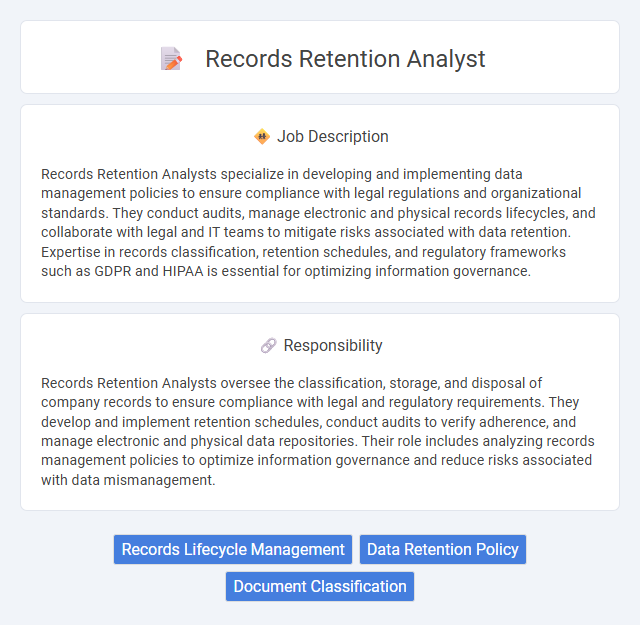
Records Retention Analysts specialize in developing and implementing data management policies to ensure compliance with legal regulations and organizational standards. They conduct audits, manage electronic and physical records lifecycles, and collaborate with legal and IT teams to mitigate risks associated with data retention. Expertise in records classification, retention schedules, and regulatory frameworks such as GDPR and HIPAA is essential for optimizing information governance.
Individuals with strong organizational skills and attention to detail are likely well-suited for a Records Retention Analyst role, as the job demands careful management and compliance with data retention policies. People who are comfortable working independently and possess a methodical approach to handling sensitive information may find this position particularly fitting. However, those who prefer dynamic, fast-paced environments or flexible task variety might find the repetitive nature of record retention less suitable.
Qualification
A Records Retention Analyst must possess strong knowledge of data management principles, legal compliance, and records retention policies. Proficiency in electronic document management systems (EDMS) and relevant regulations such as GDPR, HIPAA, or Sarbanes-Oxley is essential for ensuring proper data governance. Strong analytical skills, attention to detail, and experience in auditing records retention processes help maintain organizational accountability and security.
Responsibility
Records Retention Analysts oversee the classification, storage, and disposal of company records to ensure compliance with legal and regulatory requirements. They develop and implement retention schedules, conduct audits to verify adherence, and manage electronic and physical data repositories. Their role includes analyzing records management policies to optimize information governance and reduce risks associated with data mismanagement.
Benefit
Records Retention Analysts likely help organizations manage and safeguard critical information, reducing the risk of data loss and compliance penalties. Their expertise in organizing and maintaining records may improve operational efficiency and support legal auditing processes. Companies probably benefit from cost savings by minimizing storage needs and enhancing data retrieval speed through effective retention strategies.
Challenge
The role of a Records Retention Analyst likely involves navigating complex regulatory requirements and ensuring compliance across diverse data sets, which can present significant challenges. Managing the lifecycle of records while balancing organizational policies and legal obligations probably requires meticulous attention to detail and strong analytical skills. There is a high probability that handling evolving data privacy laws and coordinating with multiple departments adds to the complexity of the position.
Career Advancement
A Records Retention Analyst oversees the classification, storage, and secure disposal of corporate documents to ensure legal compliance and efficient information management. Gaining expertise in records management systems, regulatory standards such as GDPR and HIPAA, and data governance policies significantly enhances career prospects in this field. Advancement opportunities often lead to senior roles like Records Manager, Compliance Officer, or Information Governance Specialist, with increased responsibility for strategic data lifecycle management and cross-departmental collaboration.
Key Terms
Records Lifecycle Management
A Records Retention Analyst specializes in managing and optimizing the records lifecycle to ensure compliance with regulatory requirements and organizational policies. They develop and implement retention schedules, oversee the secure storage and retrieval of records, and facilitate timely disposition or archiving based on the records' value and legal mandates. Expertise in electronic records management systems and knowledge of data privacy laws enhance their ability to maintain accurate, accessible, and compliant records throughout the lifecycle.
Data Retention Policy
A Records Retention Analyst ensures compliance with data retention policies by developing, implementing, and monitoring protocols that govern the storage and disposal of organizational records. This role involves analyzing regulatory requirements such as GDPR, HIPAA, and Sarbanes-Oxley to maintain accurate retention schedules that mitigate legal risks. Mastery of data classification and lifecycle management enhances the organization's ability to securely preserve critical information and streamline audit processes.
Document Classification
A Records Retention Analyst specializes in organizing and managing corporate documents by applying precise document classification techniques to ensure compliance with legal and regulatory retention policies. They leverage advanced categorization frameworks and metadata tagging to streamline document retrieval and secure sensitive information throughout its lifecycle. Expertise in information governance and retention schedules supports the optimization of record-keeping processes and risk mitigation strategies.
 kuljobs.com
kuljobs.com